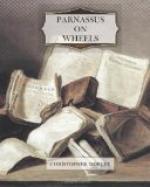I waited some time, and finally I got tired of looking at the Life Insurance calendars. Then I happened to glance out of the window. Surely that was the Professor, just disappearing round the corner with another man?
I returned to the cashier’s desk.
“What’s the matter?” I said. “Your mahogany furniture is charming, but I’m tired of it. Do I have to sit here any longer? And where’s Mr. Mifflin? Did he get his money?”
The cashier was a horrid little creature with side whiskers.
“I’m sorry you had to wait, Madam,” he said. “The transaction is just concluded. We gave Mr. Mifflin what was due him. There is no need for you to stay longer.”
I thought this was very extraordinary. Surely the Professor would not leave without saying good-bye? However, I noticed that the clock said three minutes to three, so I thought that perhaps he had had to run to catch his train. He was such a strange little man, anyway....
Well, I went back to the hotel, quite a little upset by this sudden parting. At least I was glad the little man had got his money all right. Probably he would write from Brooklyn, but of course I wouldn’t get the letter till I returned to the farm as that was the only address he would have. Perhaps that wouldn’t be so long after all: but I did not feel like going back now, when Andrew had been so horrid.
I drove Parnassus on the ferry, and we crossed the river. I felt lost and disagreeable. Even the fresh movement through the air gave me no pleasure. Bock whined dismally inside the van.
It didn’t take me long to discover that Parnassing all alone had lost some of its charms. I missed the Professor: missed his abrupt, direct way of saying things, and his whimsical wit. And I was annoyed by his skipping off without a word of good-bye. It didn’t seem natural. I partially appeased my irritation by stopping at a farmhouse on the other side of the river and selling a cook book. Then I started along the road for Bath—about five miles farther on. Peg’s foot didn’t seem to bother her so I thought it would be safe to travel that far before stopping for the night. Counting up the days (with some difficulty: it seemed as though I had been away from home a month), I remembered that this was Saturday night. I thought I would stay in Bath over Sunday and get a good rest. We jogged sedately along the road, and I got out a copy of “Vanity Fair.” I was so absorbed in Becky Sharp that I wouldn’t even interrupt myself to sell books at the houses we passed. I think reading a good book makes one modest. When you see the marvellous insight into human nature which a truly great book shows, it is bound to make you feel small—like looking at the Dipper on a clear night, or seeing the winter sunrise when you go out to collect the morning eggs. And anything that makes you feel small is mighty good for you.
“What do you mean by a great book?” said the Professor—I mean, I imagined him saying it. It seemed to me as if I could see him sitting there, with his corncob pipe in his hand and that quizzical little face of his looking sharply at me. Somehow, talking with the Professor had made me think. He was as good as one of those Scranton correspondence courses, I do believe, and no money to pay for postage.




